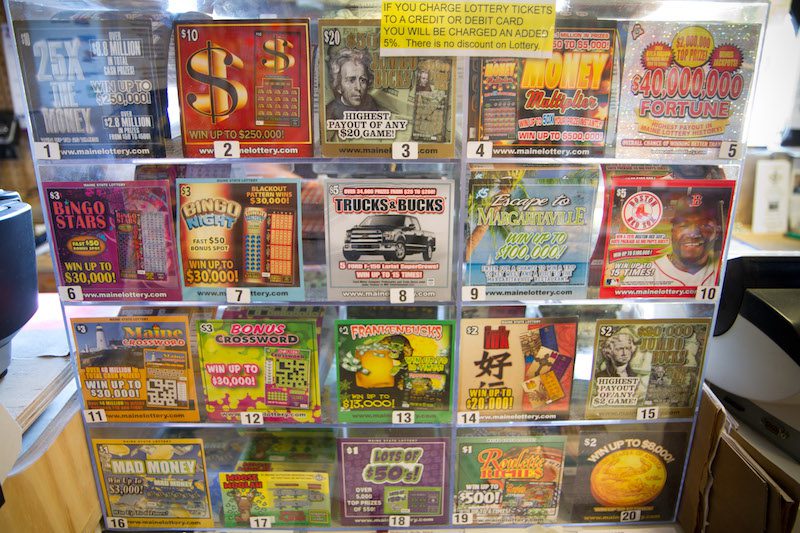AUGUSTA — Lawmakers from both parties on Wednesday called for a bipartisan effort to pass legislation implementing a ban on people on public assistance buying lottery tickets with taxpayer-funded benefits.
The call to action follows revelations this week by the Maine Center for Public Interest Reporting that recipients of public assistance won $22.4 million in lottery prizes since 2010, including eight jackpots worth at least $500,000 apiece. The information was obtained through a public records request to the state Department of Health and Human Services (DHHS).
To win that amount, the recipients on the state’s three key public assistance programs would have had to spend “hundreds of millions of dollars” on lottery tickets, according to a calculation by a Cornell University economist and expert in lottery spending.
Critics have pointed out that by receiving state benefits, recipients have more of their own cash to use to buy lottery tickets. Neither the analysis by DHHS nor the Cornell calculation could determine if the benefits recipients used taxpayer money or their own money to buy the tickets.

“What people do with taxpayer money is everybody’s business,” said state Sen. Justin Alfond, D-Portland. “State assistance is meant to help Mainers put food on the table, keep a roof over their heads, cover medical expenses and keep up with the bills — not to be spent on lottery tickets.”
Adrienne Bennett, the spokeswoman for Gov. Paul LePage, said, “This is not a new issue. Gov. LePage has been introducing legislation year after year, but it’s a fight every time we go to the legislature to close these loopholes.”
Welfare reform has long been a key issue for the LePage administration, which has implemented a number of reforms to curb what it sees as waste and abuse in the state’s $2.87 billion benefit programs. Those programs are food stamps, aid to families and MaineCare.
The administration has begun putting photos on the electronic benefit (EBT) cards low-income families use to obtain cash to buy food and other necessities — an effort to fight fraud — and earlier this year began requiring drug screenings for certain welfare recipients.
Yet repeated proposals by the Governor, and bills put forth by lawmakers of both parties to prohibit the purchase of lottery tickets, as well as items like tobacco, have failed to gain bipartisan support.
Spokesmen for both parties said the “fine print” has kept the two parties from finding a solution to the problem.
“This is one of the few areas of welfare reform that we could all agree on,” said Mario Moretto, a spokesman for the Senate Democrats, of a proposed ban on purchasing lottery tickets with public benefits. “It’s a no-brainer.”
But he said recent Republican proposals to restrict the spending of benefit money on lottery tickets have been included in bigger bills with provisions Democrats didn’t support. “It can’t be lumped in with their entire wish list,” Moretto said.
A spokeswoman for House Speaker Mark Eves, a Democrat, said in an email, “The Speaker is not going to comment on the follow up piece, but thank you for reaching out to us.”
Republicans, meanwhile, said that competing proposals from Democrats to ban spending on lottery tickets failed to put “teeth” into enforcement and sanctions for violating rules.

“It’s a hard problem to solve. But if someone is abusing a public program, they need to be punished. This isn’t their money. They’re not entitled to it. This is taxpayer money,” said state Senate Majority Leader Garrett Mason, R-Lisbon. “Republicans aren’t against the safety net. They’re against abuse of it. And that’s what this is.”
At least 37 states have passed reforms that restrict the way in which benefits under the Temporary Assistance for Needy Families (TANF) can be used, according to the National Conference of State Legislatures.
Arizona and Kansas, for example, have prohibited the use of TANF benefits on lottery tickets.
The Supplemental Nutrition Assistance Program (SNAP), commonly known as food stamps, also prohibits the purchase of anything other than food items with benefits.
The key to successful regulation, said legislators of both parties, is balancing reform while protecting the neediest.
“I would love to slam the door on any use of EBT funds to buy lottery tickets,” said state Sen. Anne Haskell, D-Portland. “We need to address this situation in a way that protects taxpayer dollars while ensuring no one who still needs a little help loses it unnecessarily.”
Mary Mayhew, DHHS commissioner, told the AP that she supports efforts to adjust the law.
“We would support any additional legislation to ensure tax dollars are used only for the truly needy and supporting their needs, not subsidizing gambling activities,” she said.







